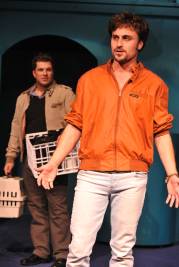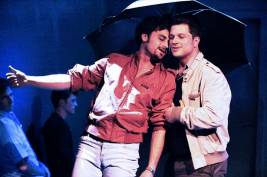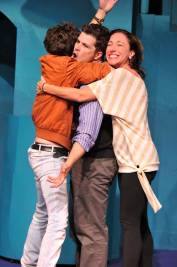
The year was 1985 and New York City’s gay male population was gripped by a fear akin to that which the citizens of London must have felt in 1665 at the outbreak of the Great Plague. Only four years had passed since a New York Native news article headlined “Disease Rumors Largely Unfounded” had reassured its readers not to worry about grapevine tales of a so-called “gay cancer.” By 1985, that disease, or more accurately put, that syndrome had its very own acronym, though it was not until that very year that President Ronald Reagan finally said the word AIDS in public. There were 5636 known AIDS-related deaths in the United States in 1985.
1985 was also the year that a pair of plays debuted off-Broadway within a six-week span, dramas which gave a human face to an epidemic which was then still only in its earliest stages—William M. Hoffman’s As Is and Larry Kramer’s The Normal Heart.
In the ensuing quarter century, As Is has largely been overshadowed by The Normal Heart, whose recent Broadway revival garnered five Tony nominations, winning in three categories including Best Revival Of A Play. Still, as its current Los Angeles intimate stage revival makes abundantly clear, there is ample reason not to let As Is fade into theatrical history. Dramatic, poetic, surreal, and profoundly moving, yet with a sassy sense of humor that would do any gay man proud, As Is has been brought back to life by The New American Theatre in a production whose direction by John Farmanesh-Bocca truly merits the word “inspired,” and whose ensemble cast deliver performances so powerful they can truly be described as inspirational.
At its heart, As Is is a love story, though when we first meet Rich (Charles Pasternak) and Saul (Mark Shunock), the former has recently left his lover for a hot young thing named Chet (Patrick Stafford) and the exes are acrimoniously divvying up their possessions even as Saul makes one last plea for Rich to stay. “He won’t make you happy. Don’t go. Please.”
It is not merely their breakup that has Saul in a panic this particular afternoon. He has just been to visit their mutual friend Teddy at the hospital where he lies in bed, “out of it, snorting his imaginary cocaine, doing his poppers. He doesn’t even know you’re there.” Then there’s Harry, who has Kaposi’s Sarcoma, and Matt, who has swollen glands. “I’m very frightened,” confesses Saul to his ex. “And I miss you. Say something, damn it.”
And Rich does indeed say something, three little words which shake Saul’s world to the core:
“I have it.”
Over the course of the next eighty-five minutes, we meet a hospice worker whose acerbic sense of humor gives her the strength to keep on easing the way for those who are dying. We catch glimpses of the doctors charged with Rich’s care and the hotline counselors who precede each phone conversation with the query “Are you a gay man?” We hear both from people with AIDS and from “average people,” who recall the first time they heard about acquired immune deficiency syndrome or the first time it really “hit” them or their first memorial service.
We also get a sampling of the many fear-provoked reactions that AIDS inspired. The cup of coffee Rich offers his brother is turned down in favor of a can of beer. Rich’s business partner wonders if it’s safe to use the telephone. Chet informs Rich that the red soap dish will be his from now on and his lover’s the blue. Rich’s sister-in-law won’t let her husband’s brother into their house, and their annual Christmas get-together ends up cancelled. “We’re going to Betty’s mother’s for Christmas,” brother informs brother.
At one point, Rich and Saul reminisce about the “free, wild, rampant, hot, sweaty, steamy, smelly, juicy, funky, hunky” sex they used to have, both with each other and with others in what Rich defines, not as promiscuous but as “nondirective, noncommitted, nonauthoritarian” sex.
All this is told in a highly theatrical style, with ensemble members assuming multiple roles each, a theatricality heighted by Farmanesh-Bocca’s extraordinarily imaginative direction, hardly a surprise coming from the founding artistic director of Not Man Apart Physical Theatre Ensemble. Farmanesh-Bocca has the chutzpah to open As Is with eight dancing Ronald Reagans, the entire cast sporting spookily real Reagan masks, a surreal reminder of the era in which AIDS first reached our national conscience, and of the man whose silence on the matter did indeed equal death.
Farmanesh-Bocca keeps the entire cast visible much of the time, seated on straight back chairs on either side of the stage, witnesses who become participants in Rich’s and Saul’s journey.
All six supporting ensemble members shine brightly. The marvelous Francesca Ferrara gets several meaty hospice worker monologs which she delivers with humor and passion. Roy Abramsohn is equally convincing in his cameo as a gay pickup as he is in the meatier role of Rich’s brother, whose cathartic bedside visit provides some of the evening’s most gut-wrenching moments. Mark Cecil and Vanessa Waters both do fine work in various roles, including Cecil as one of Rich’s many doctors and Waters as Lily, Rich’s actress friend who introduces him to her cousin Chet with life-changing results. A pair of recent Scenie-winners complete the supporting cast in stellar fashion, Stafford once again proving himself one of our most gifted young actors as Chet and assorted other characters, and the wonderful Daniel Montgomery giving Marty et al his trademark sass and verve.
Still, there can be no As Is without a superb pair of leads, and here too New American Theatre has hit the jackpot. Scenie-winner Pasternak, founder and artistic director of The Porters Of Hellsgate Theatre Company, and the finest of the three Hamlets reviewed here in 2009, is absolutely breathtaking as a man facing his own morality with equal parts terror, valor, and defiance. Shunock, who can play everything from boy band heartthrob in Altar Boyz to a dozen or so vastly different roles in this past spring’s The Temperamentals, does his deepest, most moving work yet as the angry, sardonic, profoundly loving Saul. These two exceptional actors never leave a shred of doubt that they are this flawed, frightened, fucked up, but made-for-each-other pair of star-crossed lovers.
Kitty Rose’s set design consists mainly of painting the McCadden Place Theatre shades of green (Guillermo Parma is scenic artist) and placing various pieces of furniture on it, but in its simplicity it works, particularly as lit ever so artfully by Jessica Kohn. Rachel Engstrom’s excellent costumes allow us to differentiate between the play’s multitude of characters. Farmanesh-Bocca’s and Ron Klier’s outstanding sound design situates us smack dab in 1985 along with upping the production’s dramatic tension and impact. Noah Silverstein is stage manager. As Is is produced by Jack Stehlin and Jeannine Wisnosky Stehlin.
William M. Hoffman’s As Is proves a worthy follow-up to The New American Theatre’s multiple Scenie-winning revival of Robert Anderson’s I Never Sang For My Father. Unlike the current disastrous revival of the similarly AIDS-themed mid-‘80s Jerker, Farmanesh-Bocca and cast are deeply respectful of the playwright’s words and intentions, all the while infusing them with abundant imagination and passion. No one with a heart can fail to be moved by this exquisite production.
The New American Theatre at the McCadden Place Theatre, 1157 N. McCadden Place, Hollywood.
www.NewAmericanTheatre.com
–Steven Stanley
November 18, 2011
Photos: Daniel G. Lam






 Since 2007, Steven Stanley's StageSceneLA.com has spotlighted the best in Southern California theater via reviews, interviews, and its annual StageSceneLA Scenies.
Since 2007, Steven Stanley's StageSceneLA.com has spotlighted the best in Southern California theater via reviews, interviews, and its annual StageSceneLA Scenies.







 COPYRIGHT 2024 STEVEN STANLEY :: DESIGN BY
COPYRIGHT 2024 STEVEN STANLEY :: DESIGN BY